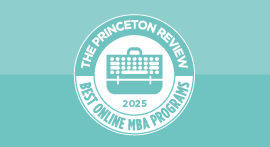Academics
The University of Missouri—St. Louis is a smart choice for local professionals who want to complete an MBA without interrupting their career. One of four "AASCB-accredited schools in the St. Louis area," UMSL offers several MBA options: the traditional evening MBA, the professional MBA, and the international MBA, offered in conjunction with partner universities overseas. For students in the evening program, "convenient class schedules" make UMSL a great choice (though evening students also say, "there is a great need for online course options" to provide greater flexibility). While classes in the evening program generally meet once a week, the professional MBA is a hybrid program, which combines weekend course work with online communication. As these options illustrate, the school's programs are principally geared toward "working professionals that attend UMSL and come to class and go home." However, the student body seems to be "shifting to younger students as they recognize the education level being received…surpasses the minimal cost to attend." On that note, USML is an excellent value. This school maintains a "good reputation in the St. Louis area for providing a good, quality business education," while also maintaining a "very affordable" tuition price.
The curriculum in both the evening and professional format provides training in the functional areas of business (though students in the evening program may also pursue an area of emphasis through elective course work). By all accounts, the administration is very "well-organized" and the curriculum is "up-to-date on trends and technology." At the same time, some students would like to see the core courses more ably synched. In some cases, "courses are repetitive," and students feel the MBA "should encompass a more general/integrated look at business and manage[ment]." Throughout the MBA, there is an emphasis on "combining the practical knowledge with the theoretical knowledge" in the classroom. At UMSL, "The professors are almost all professionals in their field," who "teach about real-world work experience and tie current events into the curriculum." Here, talented professors "make the course work interesting by providing practical knowledge in addition to theoretical knowledge, and truly being engaged in the industry." In fact, in the rare case that a teacher doesn't excel in the classroom, they nonetheless are experts in their fields. A student remembers, "There have been a few that were poor teachers but were good technically on the subject matter." Despite their real-world credentials, faculty "all seem to teach for the love of teaching versus for the pay," and they are "readily available outside of class and are always willing to help."




